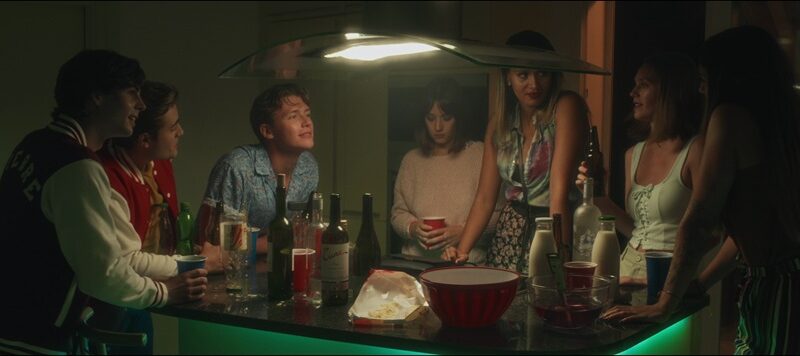Last Party (Dozol, 2024)
Do a word cloud of early reviews of Last Party, and the most frequently used adjective would most likely be “confusing.” There are, of course, films that are confusing by design rather than by accident, so critics are always prone to hedge their bets when they attach the “c” word to a film. Stating one is confused says as much about the reader as it does about the film.
Four teenagers at a graduation party in Switzerland is hardly confusing subject matter, so we are mostly talking about style. And it is not surprising that the bulk of director Nicolas Dozol’s comments in the press notes are about the shooting style. There is very little discussion of the plot (as, indeed, very little happens in the film) but a lot of discussion about the “tone” of the film, how it was created (lengthy shots with little cutting) and what it was meant to convey (angst).
Don’t get me wrong, there are plenty of crazy good movies where the filmmakers invite or require viewers to attend closely and participate in creating meaning. But there are also those in which “mood piece” or “dreamscape” descriptors become ways of making vague, inarticulate claims about a film’s style without saying anything too specific or falsifiable about its content.
About a third of the way through Last Party, two of the teens are introduced. “What do you do in life?” one asks the other. This is an odd bit of dialogue. Is it intentional? A cosmic, rhetorical question about purpose? Or is it some sort of French idiom badly translated in the subtitles? After taking a sip of a drink, a female character begins acting and feeling sick. In a surrealistic styling, her body may (or may not) change color. Is this a bad drug trip? A bit of surreal symbolism? Or just a cool use of colored filtering that signifies no more than would a random J.J. Abrams lens flare?
The end result is a film that feels long at seventy minutes, and where the audience is never quite sure whether the listlessness we feel is meant to mirror what the characters are experiencing or is simply caused by a narrative that tells us what the characters are feeling and not much else.

